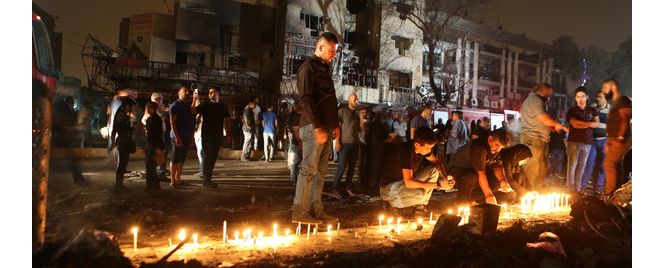WHY ISIS IS 'LASHING OUT,' FROM BAGHDAD TO BANGLADESH.
Just days after the Iraqi government declared it had ousted ISIS from Fallujah, the militant group unleashed the deadliest bombing Baghdad has seen since 2006.
ISTANBUL, TURKEY — The ousting of Islamic State fighters from Fallujah was supposed to make Baghdad safer, by showing that the jihadists could be defeated and deprived of a safe haven from which to attack the Iraqi capital.
But at midnight on Saturday, just days after Iraq declared victory in Fallujah, a truck bomb detonated in the central Karrada district, killing 215 people in the deadliest single bombing Baghdad has seen in a decade.
For Baghdad’s embattled residents, the blast was revenge for the loss of Fallujah, and yet more tragedy at the hands of IS, also known as ISIS – which they were told was on the run and facing defeat.
“The suffering of our neighbors is unbearable. They are in shock. Children are afraid,” says Amal Hussein, a recent college graduate whose sister’s family lives a block from the attack. Her sister, Zeinab, was inconsolable; four people died in their damaged building. “We spent all night praying for these people.”
While Iraqis mourn, again, analysts say the link between the Fallujah victory and the Baghdad bomb is a microcosm in Iraq of a broader phenomena. As the jihadist group loses ground in battlefields from Iraq and Syria to Libya, it is demonstrating that it can morph its tactics to conduct spectacular suicide attacks with conventional terrorist tools, from the heart of Europe to southern Asia.
In the past week, as the holy Muslim month of Ramadan has been drawing to a close, IS claimed a string of high-profile events, including a triple suicide attack against Istanbul’s main airport; a raid and hostage-taking in Dhaka, Bangladesh; and, as well as the Baghdad bomb, three separate suicide attacks in Saudi Arabia on Monday.
The Pentagon says that more than 9,500 airstrikes against IS targets in support of anti-IS fighters of all stripes have eroded the self-declared “Islamic Caliphate” by a third in the past two years. In late May, IS spokesman Abu Mohammed al-Adnani acknowledged the territorial losses and even presaged more to come, but called for attacks during Ramadan, especially by followers in Europe and America. He promised that IS would strike even if it is “driven into the desert.”
“What we see right now is a lashing out of the group,” says Shiraz Maher, deputy director of the International Center for the Study of Radicalism (ICSR) at King’s College London. “They are losing ground, they are being squeezed, but I don’t think they are suffering an existential loss of territory at this moment.”
The variety of tactics should not be a surprise, he says, considering how IS actions and calls to loyalists can spark local actions, creating a “force multiplier” that makes IS different things to different people.
“We tend to have a static view of what IS is,” says Mr. Maher, author of the newly released book “Salafi-Jihadism: The History of an Idea.”
“If you are a Parisian drinking in the Marais, it’s a terrorist group that guns you down when you are socializing with friends on a Friday night. If you are another Syria rebel … it’s an aggressive and annoying insurgency that is acting against your interests. And if you are in Raqqa [IS headquarter city in Syria], it’s a proto-state,” says Maher.
“So the idea that it should be one or the other is wrong. It’s a kaleidoscopic movement that can be all of these things at the same time.”
Bid to push Iraqis to turn on each other
The changing nature of IS and how it strikes is one reason Baghdadis were so surprised at the scale of the weekend attack. The Karrada district is largely Shiite, like the militias who controversially joined the Iraqi Army in pushing IS out of Fallujah.
But military victory created a sense of receding danger, on top of positive spin by politicians about marching on Mosul – Iraq’s second largest city, held by IS since June 2014.
“Daesh is not losing on the security file, but on the military file only,” says Hisham Alhashimi, a security analyst in Baghdad, using the Arabic acronym for IS. “They are changing their method from an ideological war to a secret, underground one. They are reactivating these [bombing] operations, and the tempo will sometimes be up and sometimes be down.”
UN Iraq envoy Jan Kubis said IS fighters who have “suffered defeats at the battlefront are seeking to avenge their losses by targeting vulnerable civilians.”
Yet in Iraq, there is another purpose, says Mr. Alhashimi.
“They are banking on [sparking] a sectarian war,” he says. Ethnic cleansing swept Iraq in 2006-07, when Shiite militias and Sunni insurgents – under the name Al Qaeda in Iraq (AQI), the precursors to IS – killed for their sect. “We will see new, quality activities…. They will increase their targeting of women and children more than before. Why? To make pressure on the government and the Iraqi army, to stop attacking them.”
Despite military losses, IS not on back foot
The numbers of foreign recruits to IS are reportedly down by 90 percent, and anecdotal information indicates dissatisfaction among many foreign jihadists, at least some of whom have contacted diplomatic missions in Turkey asking for safe passage home.
In Washington, “on the operational side there’s no illusion that they’re on the back foot,” says Aaron Stein, an analyst at the Atlantic Council. “So the planning for ISIS 2.0 is this exact question: What does ISIS turn into when it’s defeated territorially in these two places?”
“We’ve already seen this movie,” says Mr. Stein. He notes that despite AQI being largely defeated by US surge troops and Sunni “awakening” allies less than a decade ago, “it doesn’t take much to reconstitute themselves.”
ISIS 2.0 “will be an insurgent group,” he says. Even in Kurdish areas where IS has been forced out there are frequent bombings, by “left-behind [IS] guys, acting like insurgents.”
“When they lose, I just think they will bundle themselves up and find another way. And they’ll get smaller, and even more clandestine,” says Stein. “You destroy them and they just keep growing back.”
He says Turkey, which is so close that you can "smell things across the border" in Syria, is particularly vulnerable to attacks – even though IS "can’t bring down the government or gain territory in Turkey.” Last week's Istanbul airport attack, perpetrated by three foreigners, killed 45.
What does victory look like?
One conundrum is how to define victory against such a flexible organization.
“I’m not entirely sure that inflicting a sudden and massive loss of territory on [IS] is desirable,” says Maher at ICSR.
He notes that, from the day after the Sept. 11, 2001, attacks on the World Trade Center, a “really generous” estimate of just 500 hardened Al Qaeda operatives managed to perpetuate conflict ever since. By contrast, IS has an estimated 30,000 active fighters who are far better trained and capable in arms and making bombs – thousands of whom have Western passports.
“If you just destroy their territory and these guys scatter into the wind … you have to find, and track, and keep tabs on them, and that is really difficult,” says Maher. “A few get through to Europe and regional countries, but in essence we know where the bulk of them are.”
Follow us on Twitter - @akatechsolution / @smartdevicess
Leave a Comment
Let Millions of People know about your Product(s) / Service(s)
Target a Specific Audience on different News Categories
Our Partners
"Making the simple complicated is commonplace; making the complicated simple, awesomely simple, that's creativity"
- Charles Mingus










































.png)


















